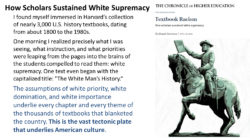
Then and Now
From 1868 (and a 14th amendment that gave birth to black “Americans”) to 1968 (which saw the brutal murder of a black Christian preacher whose elevated voice of the oppressed was silenced), 100 years of segregationist policies and practices protected and preserved white supremacy and oppressed nonwhites.
Those policies & practices didn’t die with the reverend Dr. Martin Luther King Jr. They remain in place today, more than 50 years later, in every city in America.
Throughout our nation today, the messages from King are muted & diluted to protect the sensitivities of those who prefer to not relive the past or repeat the admonitions of America’s most famous King to generations who never heard them. This sentiment unknowingly ignores the very heart of King’s message to 4,000 white audience members in San Diego in 1964 when he gave 4,000 minds 4,000 epiphanies with his message: “America is sleeping through a ‘Great Revolution.'”
Indeed, King’s message in 1964 still applies 100 percent today. We are not speaking of the past to relive the past. We look to the past to understand how we got to where we are today & gain insight into the depth, breadth & scope of the problems in our society today compared to our past. These comparisons can be measured in empirical data. Such knowledge is key to developing sustainable solutions to systemic problems.
Many of us assume we are better off today than in King’s day. Research data across myriad sectors of society disagrees with that assumption. The numbers don’t lie. In my consulting practice we show the data. We watch jaws drop with incredulity. Most Americans have never seen such data; and most ignore the issue of race as much as possible. People cannot teach what they don’t know. Neither can they change the status quo by ignoring problems it generates.
CURRENT PARADIGM
20th century status quo beneficiaries continue to benefit from the status quo of segregationist policies and practices today in the 21st century. So, why change anything? That is the sentiment of far too many in society today.
My appeal is to those interested in better understanding of the consistent persistent outcry from the nation’s Most Vulnerable Populations (MVP). That’s why I approach schools, churches, media and political parties. These are influential societal institutions with organized infrastructure, capacity & influence. My hope is they care enough to want the kind of change I believe is possible to benefit a much broader population of Americans than the status quo.
My hope is that both political parties and other institutions of influence will demonstrate strong enough interest in resolving the systemic institutionalized biases that continue to undermine progress for many while reserving benefits for some.
My wife & I launched a popular workshop last year on how to talk to kids about race in America that offers insights, resources and practical tools unlike any ever previously produced. It is worth experiencing on any day, not just MLK Day.
 ABOUT THE WORKSHOP
ABOUT THE WORKSHOP
Rather than simply offer information on the valued contributions of nonwhite Americans, our workshop endeavors to empower all participants, but particularly white Americans, with critical knowledge that no schools are teaching, yet is essential to improving the understanding of educators and parents in equipping children as empathetic change agents who inherited a deeply flawed society that they will be relied upon to change into a more equitable environment with pathways to prosperity for all in a multicultural society throughout the 21st century.
This change cannot and will not occur as long as adults sideline or ignore the core issue of racial hierarchy embedded in the bedrock foundation of all major political issues.
In my work as a national consultant on economic development strategies for inclusive local economies, I easily identify 20th century segregationist policies and practices everywhere I go. Too many local leaders lack historical knowledge of segregationist policies in their own cities and regions. The questions I raise boil down to these three:
1. Are you aware of the history?
2. Once aware of how historical precedents are sustained today, do you care enough to compel change?
3. How can we work together to encourage and make sustainable systemic change?
Both major parties often speak admirably of economic productivity and say they support improving the economic productivity of all populations of Americans. So I reach out to engage. Unfortunately, my efforts to inform both parties of critical relevant facts and data necessary to fully understand the racial problems we are dealing with today have been thwarted. Too often issues about race are relegated to a lower value on the priority list and dismissed as a matter of annual obligatory commemoration during “black” days on the calendar.
EMBEDDED RACIAL POLICIES
My hope is this year will be different. To be clear, I’m trying to help the political parties tackle a ginormous systemic problem that touches every nook and cranny of society about which their policies are designed to impact:
- Education (all levels)
- Economics
- Government spending
- Ownership (housing, business, investments)
- Job creation / growth
- Business growth
- Land use
- Community development
- Economic development
- Entrepreneurship
- Investing
- R&D
- Safety & Security
- Transportation & Infrastructure
- Access to Capital
- Wealth Creation
- Innovation
- Technology
- Global Economic Competitiveness
All of these issues and more are rooted in race relations. MLK spoke specifically of the three triggers of the most important movement in US history (“Negro American Revolution”) as:
1. Segregation in schools/education
2. Discrimination in housing
3. Discrimination in banking
 NEGRO AMERICAN REVOLUTION
NEGRO AMERICAN REVOLUTION
Today, more than 50 years after King was assassinated, here’s the status of the three main issues that gave rise to the Negro American Revolution in 1963:
1. Segregation of schools is worse today than on the day King was killed in 1968
2. Homeownership today is at a 50-year low for black Americans (40 percent) & 46 percent for Hispanics while white America enjoys a rate of 73 percent
3. Banks have been fined $243B (in just the last decade) for ongoing racial discriminatory practices
If America’s top priority was a true concern for empowering her Most Vulnerable Populations (MVP), wouldn’t all of our best schools be located in our most economically deprived communities as an escape route for America’s poorest kids born into generational poverty? Yet, in most all cities the opposite is true. Why?
When a $10M Growth & Opportunity Project was launched in 2012 by the GOP, it proclaimed a need for the Republican Party to engage in an ongoing discourse & relationship with minority groups, versus tepid outreach during cyclical election seasons. That was a good goal, but it wasn’t followed through.
My personal appeal to the political parties is a continuing opportunity for local leaders to make a good faith effort to engage people like me who bring critical insights and factual resources to the table. I can help either or both parties with understanding of people of color and messaging on issues of importance to people of color.
POLITICAL MESSAGING TO BLACK AMERICANS
Both political parties tend to boil economic issues in black America down to a single talking point: unemployment. The belief that a low national unemployment rate is a valued talking point is indicative of the lack of communication between the GOP and black Americans and other people of color who are among the nation’s Most Vulnerable Populations (MVP).
When President Trump repeatedly sent a message to black American voters asking “What the hell do you have to lose?” he displayed a systemic need for greater awareness in the Republican Party about issues of greatest importance to black voters.
Dr. King laid it out concisely and concretely: education, housing and access to capital.
Ironically, in 1968, when King was sacrificing his life fighting against segregationist policies and practices, a 21-year-old Donald Trump joined his dad’s real estate business, which was actively engaged in discriminatory practices King decried. Today, King is dead and Trump is President. And after 50 years, Trump’s only insight into the concerns of black Americans is unemployment.
Jobs are certainly important, but who can bequeath their job to their kids?
Citing low unemployment figures as the quintessential factor in the GOP playbook to attract support from minorities ignores the sacrosanct notion of generational wealth, which is core to the American Dream. That ‘Dream’ is virtually nonexistent among black & Hispanic populations. Additionally, the national unemployment rate isn’t indicative of unemployment specifically among black Americans, which tracks nearly double the white unemployment rate annually for as long as data have been collected.
AMERICAN DREAMERS
Moreover, 80 percent of the nation’s employers are white, and their hiring practices have long been a root cause of the opportunity gap, which is also a trend that isn’t going to change without systemic disruption. Data that both parties would do well to embrace and amplify are equity measures. I’m referring to equity ownership.
Minority populations, just like white Americans, want an equity ownership stake in the American Dream: Ownership of homes, businesses and investments that yield positive returns. How is either party speaking to minority populations with a message that resonates with our pursuit of the American Dream?
Despite having the highest rates of entrepreneurship growth and a projected representation of 42 percent of the US population by 2045, black & Hispanic businesses collectively produce a paltry 4 percent GDP & virtually no job growth. How can there be so much activity (i.e. business creation) yet so little productivity? (i.e. revenue & job growth)
The conversation black Americans want to have with the political parties isn’t to simply bemoan the status quo of white supremacy (yet still must be addressed) and the historic nature of police brutality and corrupt system of jurisprudence & imprisonment (deeply troubling) or just rehash slavery (definitely need a resolution on reparations). These are critical issues, and still there’s more to consider and resolve. Race is at the core of every major issue, yet sidelined in every debate and campaign message.
 WE INHERITED A SEGREGATIONIST SOCIETY
WE INHERITED A SEGREGATIONIST SOCIETY
We have an entire portfolio of issues that are multigenerational. Past policies have produced the present paradigm. Sustaining past policies will inevitably sustain today’s intolerable conditions (Dr. King called “shameful”) as an inheritance for our children and grandchildren. Therefore, it is incumbent upon us to change the status quo by changing the status quo policies. But what changes must be made? We must understand the past and envision a different future for a very different population.
The continued growth of minority groups in America unfortunately increases a national intolerance among many white Christian conservatives, who prefer to sustain status quo segregationist policies and practices of the past.
Minorities are multifaceted, multiethnic, multicultural populations that require nuanced knowledge and understanding, not cookie-cutter superfluous stereotyped stigmas (rooted in racial hierarchy) that media have long perpetuated. Today, news media continue to portray negative issues and deficit-based narratives falsely as the sum total of what race relations are about. This ignorance pervades the nation and prevents real discourse from occurring. Without real discourse, how can we achieve real progress?
NEW DIALOGUE ON RACE
Each year, MLK Day & Black History Month compels the nation’s institutions of influence to focus a spotlight, however temporary, on black America. We want to capitalize upon that spotlight. However, the collective yawn across much of white America is telling in the rote exercises that offer safe non-threatening information, superficial events and instant amnesia when the calendar turns to March Madness (oh, the irony!).
Still, each year we all have yet another opportunity to connect, communicate and collaborate to collectively redesign, reform and reconstruct the 20th century segregationist society we all inherited into a 21st century equitable environment with access or opportunities and pathways to prosperity for all Americans in our multicultural society.
The question you and I get to answer is: Will we take the next step forward tomorrow together or again miss this opportunity until next year?
- How to Build a Measurable Pathway to Racial Equity in One Generation – by Mike Green - November 8, 2021
- Talking about Race in 2020 – by Mike Green - January 16, 2020

 ABOUT THE WORKSHOP
ABOUT THE WORKSHOP NEGRO AMERICAN REVOLUTION
NEGRO AMERICAN REVOLUTION WE INHERITED A SEGREGATIONIST SOCIETY
WE INHERITED A SEGREGATIONIST SOCIETY
Thank you so much for that piece, Mike. It’s an excellent and timely article, I appreciate you writing and sharing it. I believe that all those in the leadership positions (national, state and local communities should read your work, especially this one. It will surely provide them with the critical information that they often know little or nothing and yet they are quick to sideline line them rather than confronting them.
Thanks!
That picture of you indicates that you have no understanding of the history of which you speak!
The picture of Mr. Green and his family? Please… what picture are you referring to?
I believe the reference is to the heading photo of his interracial family.
With all due respect ma’am, Mr. Green most definitely knows about which he speaks. He is extremely knowledgeable, is extremely well-read, and he has done-and he continues to-research on the topics about which he writes and speaks.
Mr. Green is a phenomenal resource for those who wish to learn, who wish to further our research, and who continue to fight for justice.
Yes, it is, in fact, more than plausible that a black man- who is married to a white woman-knows EXACTLY about which he speaks, about which he writes, and about which he fights. Yes, it is more than plausible; it is, for a fact, true.
I implore you to read more of Mr. Green’s writing. He truly is a genuine, honest, factual writer. Mr. Green is not a “shove it down your throat” type of author and advocate. No harm in giving him a shot-all I ask is that you go beyond the picture of his family and read a few of his pieces. If you don’t like his writing-no problem. Not every author is for every one of us.